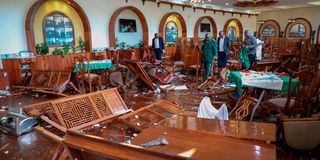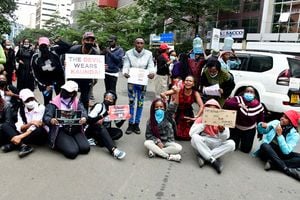
Furniture in the National Assembly's dinning hall that were vandalised by rioters who stormed Parliament Buildings on June 25, 2024.
The invasion of Parliament by young protesters on June 25 over the draconian Finance Bill 2024 that was subsequently withdrawn has changed the way the House conducts business.
Although lawmakers have now taken a break and will resume on September 17, during the session after the uprising, lawmakers have paid more attention to how the public will perceive their actions.
This week, the MPs held an informal meeting to respond to rising protests from students joining university who are unhappy with a new funding model that is asking households to pay more.
After the session, the MPs resolved to press government to merge multiple scholarships by various bodies into one huge kitty in a step towards making free education a reality.
During the session, vetting of the new cabinet secretaries was in their to-do list and unlike before, this time members of the public were allowed to submit live questions during the vetting process.
The questions were compiled and given to the spokesperson, who put them to the nominees, who then responded.
Other questions were also sent directly to members of the committee, who took turns reading them to the nominees. This was not the tradition in Parliament.
In a departure from the past, the National Assembly this time did not throw out memoranda sent by the public, especially those not accompanied by affidavits as required by law. It was influenced by the imminent fear of a popular uprising. They didn't want to appear to be helping the executive wing of the government to confirm the nominees.
The House turned such memoranda, which raised valid issues, into questions to be posed to the nominees during the vetting process.
"We wanted to be as open as possible this time in light of the protests," said a senior staffer involved in compiling the online questions.
In the end, however, the MPs rubber stamped all the nominees despite concerns raised against most of them.
When the legislators resumed after the invasion, no committee went outside Nairobi for a retreat or to write a report. This was in line with the austerity measures announced by the government following the rejection of the Finance Bill, 2024.
In a communication dated July 12, the Speaker of the National Assembly, Moses Wetang'ula, instructed committees that normally start their meetings on Monday to hold their meetings within the precincts of Parliament.
"In line with the current austerity measures and expenditure cuts, please ensure that the relevant committee meetings are held within the precincts of Parliament," Mr Wetang'ula said.
"Should the available meeting rooms be inadequate, the affected committee(s) shall hold their meetings in other government facilities," the Speaker added.
Following the invasion, the proceedings of parliamentary committees have never been the same, with lawmakers being careful about what they say.
Agencies appearing before the committees have also had a tough time, with MPs asking tougher questions than before. They no longer take public opinion for granted.
For example, during a meeting with the Teachers Service Commission (TSC) on July 17, the Education Committee's chairperson, Julius Melly, took the National Treasury to task for massive budget cuts, saying they were pitting the government against the people.
"You cannot set the government against the people, the GEN Z are on the streets now and you want their parents to join them the next day because of the failed implementation of the CBA?” Mr Melly asked.
Mr Melly's comments came after the TSC told the committee that key services that would be affected by the budget cuts include the Teachers' Group Medical Scheme, the implementation of the Collective Bargaining Agreement (CBA) with the Teachers' Union and the delay in the permanent recruitment of Junior Secondary School teachers.
The committee also cited billions of shillings deducted from the Ministry of Education, including cuts to the Higher Education Loans Board and the Universities Fund (UF) for bursaries that would have prevented 153,292 young learners from accessing government funding.
Agencies appearing before parliamentary committees have also had a difficult time, as MPs appear more animated and ask difficult questions.
When the Independent Police Oversight Authority (Ipoa) appeared before the Constitutional Implementation and Oversight Committee (CIOC) last week, it was grilled over recent police killings and abductions of people during anti-government protests.
"You have failed Kenyans who pay you through taxes, where do you expect mothers whose children have been killed to get justice when you have been silent on police brutality all this time? asked chairperson Gathoni Wamuchomba.
"It pains me to see mothers crying on the streets seeking justice from the same police who killed their children, yet we have the IPOA whose operations are funded by taxpayers," she added.







